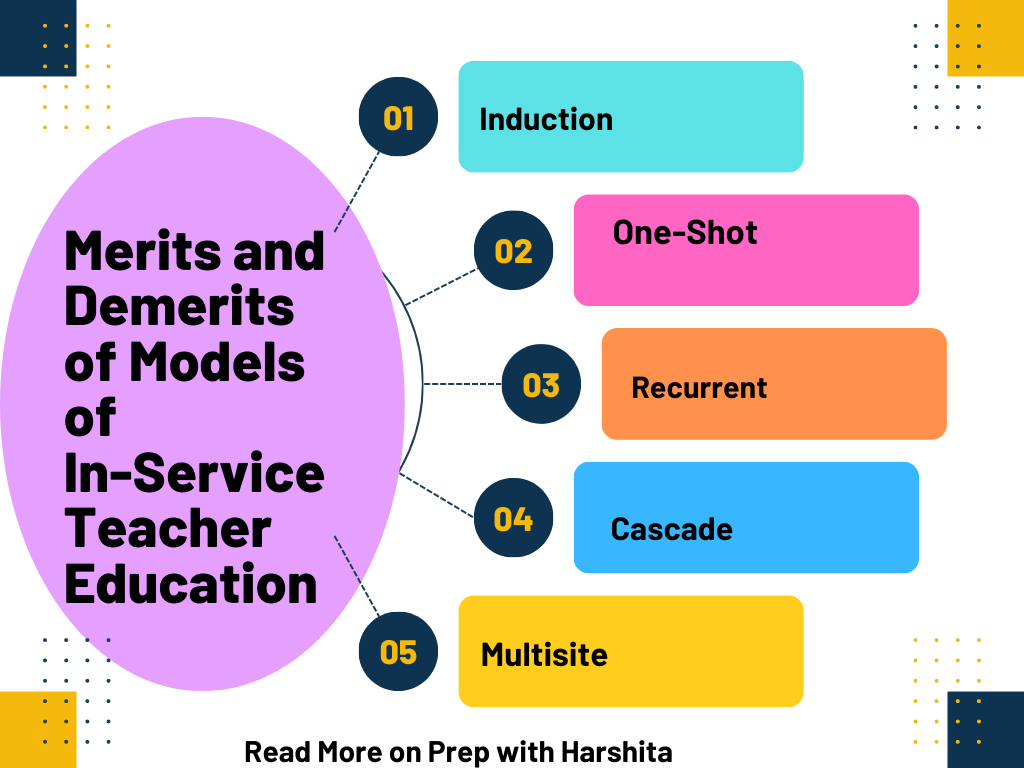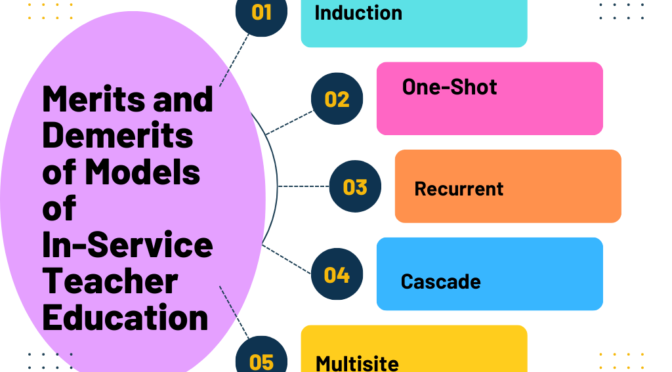There are several models of in-service teacher training that educational institutions and organizations employ.
Here are the merits and demerits of In-service teacher education models :
- Induction:
Merits:
- Provides personalized support and mentorship to newly hired teachers.
- Helps new teachers transition smoothly into their roles.
- Builds a strong foundation of knowledge and skills.
- Enhances confidence and efficacy in teaching.
Limitations:
- Limited to newly hired teachers, may not address the needs of experienced teachers.
- Can be time-consuming and resource-intensive.
- May vary in quality and consistency across different schools or districts.
- The limited duration may not allow for long-term support and development.
- One-shot:
Merits:
- Provides targeted learning experience on specific topics or skills.
- Efficient for addressing immediate training needs.
- Can be cost-effective for organizations with limited resources.
- Offers flexibility in scheduling and participation.
Limitations:
- Limited time may not allow for in-depth exploration of topics.
- Lack of follow-up or ongoing support.
- May not lead to sustained changes in instructional practices.
- Dependent on the expertise and effectiveness of the facilitator.
- Recurrent:
Merits:
- Offers continuous professional development opportunities.
- Allows for gradual learning and skill development.
- Provides regular support and feedback.
- Encourages reflection and improvement over time.
Limitations:
- Requires consistent commitment from teachers and organizations.
- May be challenging to schedule regular training sessions.
- This may lead to fatigue or saturation if the content is repetitive.
- Limited to the scope and frequency of the training sessions.
- Cascade:
Merits:
- Enables efficient dissemination of knowledge across multiple levels.
- Builds a network of trained educators for ongoing support.
- Can reach a large number of teachers in a short span of time.
- Promotes collaboration and sharing of best practices.
Limitations:
- Relies heavily on the quality and effectiveness of the initial training.
- This may lead to inconsistencies in the interpretation and delivery of content.
- Difficult to maintain fidelity and ensure accurate transmission of information.
- May not allow for individualized or personalized support.
- Multisite:
Merits:
- Facilitates networking and collaboration among educators from different contexts.
- Provides opportunities for sharing diverse perspectives and best practices.
- Expands professional networks and connections.
- Promotes a broader understanding of educational challenges and solutions.
Limitations:
- Requires coordination and logistical planning across multiple sites.
- Difficulties in aligning schedules and availability of participants.
- Limited to the resources and expertise available at each site.
- May not address specific contextual needs of individual schools.
- School-based:
Merits:
- Aligns professional development with the specific needs and goals of the school.
- Fosters a sense of ownership and relevance among teachers.
- Encourages collaboration and sharing within the school community.
- Allows for immediate implementation and application of learning.
Limitations:
- Relies on the availability and expertise of internal resources.
- May lack exposure to external perspectives and practices.
- Limited access to specialized or advanced training opportunities.
- Challenges in coordinating schedules and ensuring participation.
- Coursework:
Merits:
- Offers structured and systematic professional development.
- Provides theoretical knowledge and practical application opportunities.
- Allows for in-depth exploration of specific topics.
- Recognized certification or qualification upon completion.
Limitations:
- Requires time and commitment for coursework completion.
- May not be tailored to the specific needs of individual teachers or schools.
- Limited opportunities for collaboration and peer interaction.
- Can be expensive, especially if pursued through higher education institutions.
It’s important to consider these merits and limitations when choosing a model of in-service teacher training, as they can vary in their effectiveness and suitability based on the context and goals of the training program.
Also Visit: Prep with Harshita

Also Read: Concept of In-Service Teacher Education


Thanks for sharing. I read many of your blog posts, cool, your blog is very good. http://2345424.cryptostarthome.com